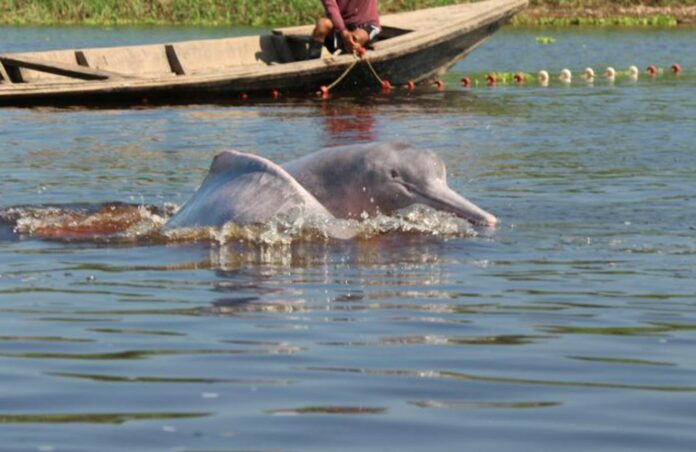“It’s clear that the Amazon river dolphin is facing increasing threats from humans.”
Research reveals that fishing and proposed new dams and dredging pose a significant threat to Amazon river dolphins, also known as the boto, bufeo or pink river dolphin.
In order to understand the dolphins’ behavior in relation to fishing areas and potential construction sites, scientists utilized satellite tags to track eight dolphins in the Peruvian Amazon.
The study found that, on average, 89% of the dolphins’ home range was utilized for fishing activities.
Furthermore, the dolphins were discovered to be, on average, 252km away from the nearest proposed dam and 125km from the nearest proposed dredging site.
While these distances may seem substantial, the dolphins’ ranges averaged over 50km, indicating that dams and dredging could affect large stretches of their habitats.
Moreover, many Amazon river dolphins, already classified as an endangered species, reside closer to the proposed sites than the individuals tagged in this study (seven males and one female).
Conducted by the University of Exeter and Peruvian conservation organization Pro Delphinus, the research highlights the increasing threats faced by Amazon river dolphins.
Dr. Elizabeth Campbell from the Centre for Ecology and Conservation at Exeter’s Penryn Campus in Cornwall emphasized, “It’s clear that the Amazon river dolphin is facing increasing threats from humans. Fishing can deplete populations of the dolphins’ prey, and dolphins are also at risk from intentional killing and bycatch (accidental catching).
While the construction of dams, primarily in Brazil, poses a growing threat with 175 already in operation or under construction in the Amazon basin and 428 more planned within the next 30 years, the approval and contracting of the Amazon Waterway project exacerbate concerns.
This project involves dredging activities across four main rivers of the Amazon basin and the expansion of ports to facilitate shipping across the Amazon, Ucayali, and Marañón rivers.
Nevertheless, the researchers assert that the Peruvian government has an opportunity to safeguard biodiversity.
Dr. Campbell stated, “Peru has a chance to preserve its free-flowing rivers, keeping them a safe and healthy habitat for river dolphins and many other species. Given that many of these dams and dredging projects are still in the planning stage, we advise the government to consider the negative effects these activities have already had on river species elsewhere.”
Dr. Campbell further recommended expanding river dolphin tracking programs to cover multiple seasons, tracking more females at the study sites, and increasing the number of tracked individuals in other regions to enhance our understanding of the species’ movement patterns.
The Amazon River dolphin, categorized as Endangered on the IUCN Red List, can be found throughout the Amazon and Orinoco River basins.
Funding for the study was provided by the South American River Dolphin Initiative and WWF Peru.
Image Credit: Jose Luis Mena
